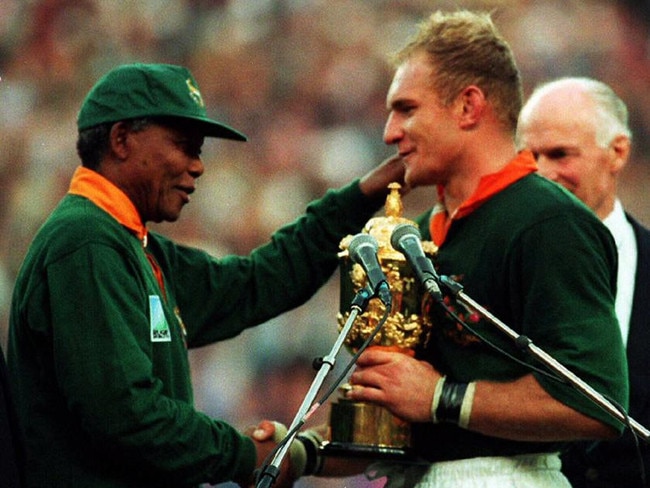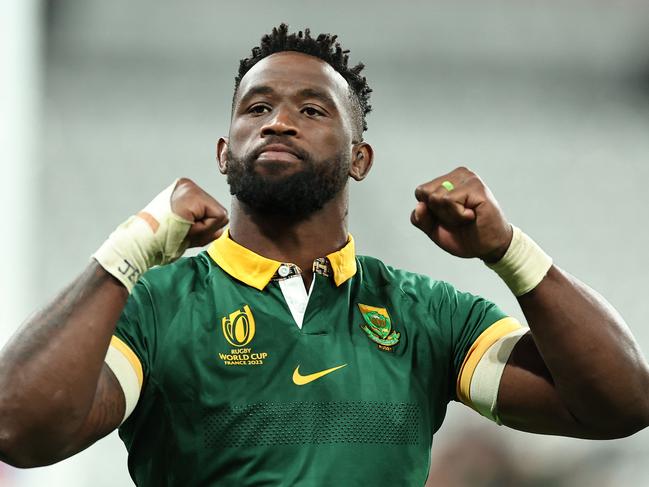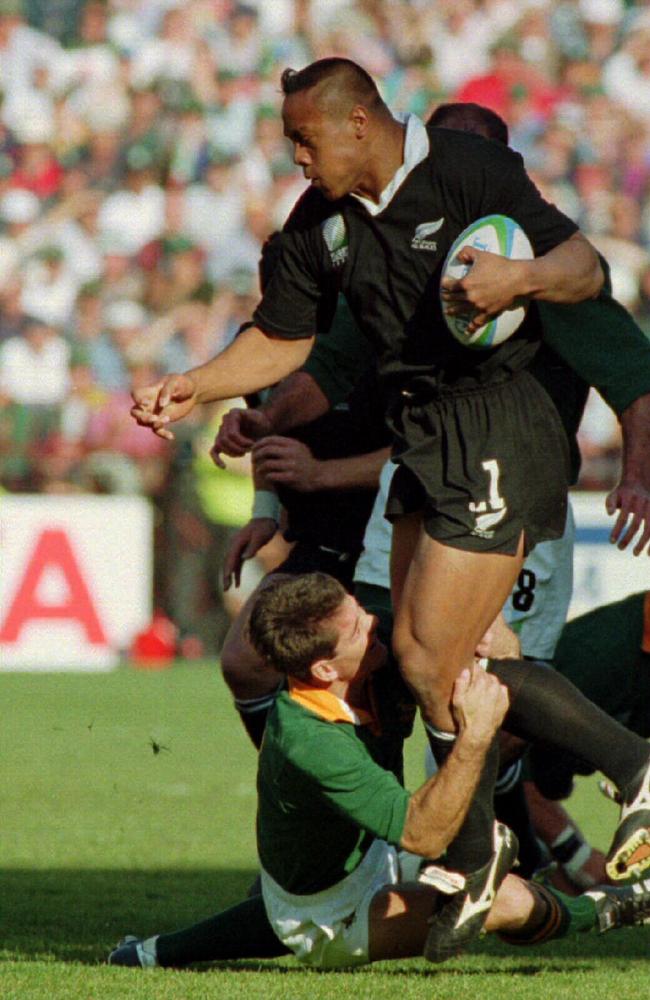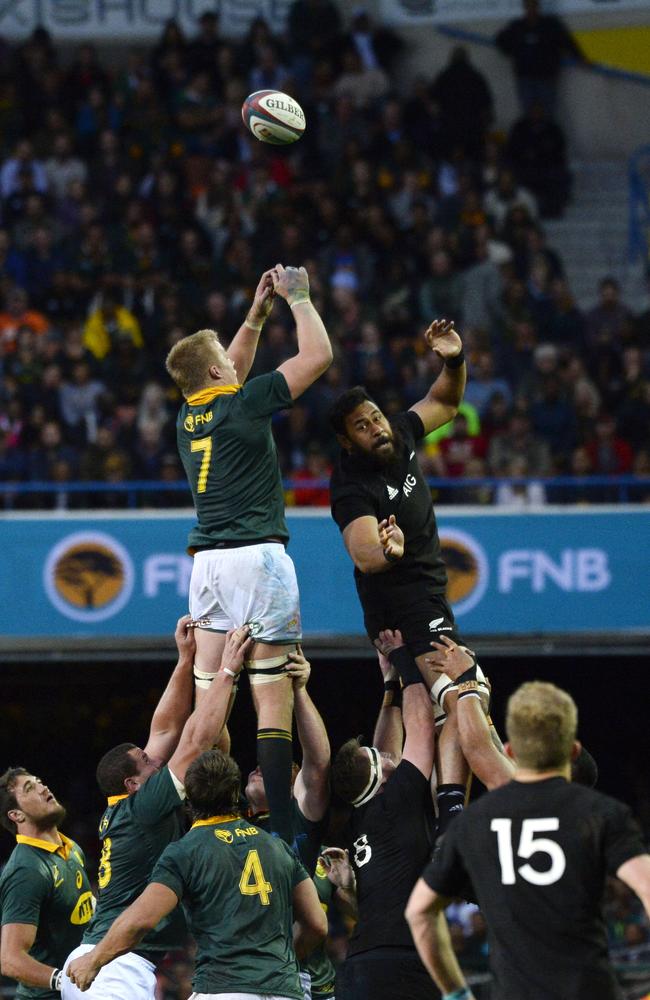Rugby World Cup: The century old love-hate relationship between Springboks and All Blacks
There is no more intense rivalry in world rugby than that between South Africa’s Springboks and New Zealand’s All Blacks, JULIAN LINDEN examines the love-hate relationship.

World Cup
Don't miss out on the headlines from World Cup. Followed categories will be added to My News.
Sport’s greatest moments always matter more when the confrontations are physical and the rivalry between the opponents is real and intimate.
A legacy of its colonial roots, international rugby is a lucky sport already overflowing with deep historical rivalries that go way beyond the field.
But none are as powerful and intense as the century old love-hate relationship between New Zealand’s All Blacks and South Africa’s Springboks, who will square off in Sunday morning’s Rugby World Cup final in Paris.
After breaking the hearts of the sport’s romantics by first killing off the Wallabies then minnows Fiji then sentimental favourites Ireland and finally the host-nation France, the rugby gods have at last shown they have a heart by delivering a climactic final that seems written in the stars.

Rugby’s two giant powerhouses, the All Blacks and the Springboks have each won a record three of the previous nine World Cups but have only faced each other once before in the final, so this is a rare treat.
And if their past encounter is anything to go by, it will also be something out of the ordinary.
That was in 1995, shortly after South Africa had been readmitted to international sport after ending its racist policy of apartheid.
Awarded the hosting rights of a tournament then still in its infancy, the Springboks overcame the odds to beat New Zealand 15-12 in extra time in what is widely regarded as the greatest final ever played, if not for the standard of rugby then certainly for the symbolism of South Africa’s first black president Nelson Mandela presenting the trophy to the team’s white captain Francois Pienaar – while wearing a replica number six jersey.
To this day, that image remains one of sport’s most powerful moments of reconciliation – alongside Cathy Freeman lighting the flame at the Sydney Olympics and the Black Power salute by Tommie Smith and John Carlos at Mexico City in 1968.

For the Springboks and All Blacks, the significance of 1995 means as much now as it did 28 years ago, though the memories and motivation for this weekend are out of kilter.
“The game from 1995, it‘s so special,” said Siya Kolisi, South Africa’s first black captain, who led the Springboks to a third World Cup title in 2019.
“I think I was four then. I didn‘t get to watch but obviously seeing videos of it and also the significance of the game is huge. It opened a lot of doors for me and many others.”
South African halfback Faf de Klerk, who was also part of the Springboks team that beat England to win the Webb Ellis Cup in Japan four years ago and again in last weekend’s semi-final, said the prospect of playing the All Blacks made Sunday’s final at the sprawling Stade de France in Paris an incomparable occasion.
“I don’t really know why but for me it doesn’t get bigger than this,” de Klerk said.
“It’s just a feeling you have inside, you can all feel it, the supporters can feel it.
“It’s spectacular. I’m looking forward to it so much – there’s a lot more to play for than just that Cup. You’re going to see some unbelievable rugby on the weekend.”

Like a lot of the current South Africans, de Klerk, 32, was too young to remember the 1995 match live but knows all about it because it‘s etched in South Africa sporting folklore – how the Springboks tackled their hearts out to stop New Zealand’s mighty winger Jonah Lomu and how Joel Stransky kicked the winning field goal deep into extra time.
“It means a lot because of the history we have with them,” de Klerk said.
“It brings back a lot of memories for a lot of people back home.
“To say you dreamt about this is probably wrong because I don’t think you dream that far.”
New Zealand’s memories of the 1995 match are understandably not quite so rosy. With Lomu seemingly unstoppable, the Kiwis went in as hot favourites but came up agonisingly short in a tryless thriller after the team mysteriously fell ill just days before the final in Johannesburg.
The conspiracists have always maintained that the All Blacks were poisoned by a waitress, known only as “Suzie”, at their team hotel and that bookmakers were involved in a sting, but none of that has ever been proved beyond doubt and none of the current Kiwis have gone down that route this week.

For Ian Foster, the New Zealand coach, who will be out of a job once the match ends, the 102-year history between the teams is proof enough of how big this weekend’s game is.
“I don’t think there’s ever a small one,” he said.
“The fact is we have two teams who have been old foes for a long time. We all remember the last final between us (in 1995), which was an epic, and hopefully this one will be the same.
“Then you do the maths and we’ve got three World Cups each and someone is going to win four, so it’s a special occasion, isn’t it?
Current form suggests there’s little between the sides so the outcome could come down to the wire.
The All Blacks lost to France in the pool stage and the Springboks were beaten by Ireland but the two southern hemisphere giants reversed those results when the match-ups crossed over for the quarter-finals.
Neither side has any obvious weakness, although their playing styles are polar opposites, with the South African ‘bomb squad’ relying heavily on tactical kicking while the Kiwis have the best attack in the world.
Add in the guarantee of a packed 80,000 seat stadium in the City of Lights that is hosting next year’s Olympic and Paralympic Games and it really is rugby’s dream decider.
“It‘s huge,” Kolisi said. “I don’t think as a player it will ever get any bigger.
“I don‘t think it’s stuff that you can dream about because it doesn’t happen often. I don’t think it will happen in our lifetime again to have two teams like this.”





